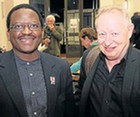
THE best way to fight widespread corruption in South Africa by elected officials and civil servants is to name and shame the people involved.
Respected Corruption Watch head Dr David Lewis said the “sheer volume of noise” generated by exposing corruption was often enough to get government ministers and officials scrambling to sort out the problem.
Speaking at the second annual Corruption Watch lecture at Rhodes University on Tuesday night, the former trade unionist and academic said they had received more than 4 000 separate reports of corruption since they were formed 16 months ago – and this was just the tip of the iceberg.
“If we are listened to when we have 4 000 reports, can you imagine what our impact will be with 40 000 reports or 400 000,” he said.
Lewis said officials had “got the message” and were now starting to react with “a definite sense of urgency because they perceive the public’s outrage and they recognise the impact that corruption is having on the quality of public life and on their own standing and electability.”
A central pillar of the Corruption Watch approach is to encourage the public to report their experiences – thereby generating vital intelligence and identifying “hotspots”.
Lewis said corruption was widespread in the Eastern Cape and affected all spheres of daily life.
Problem areas in the province that scored higher than national averages based on Corruption Watch research included: ghost workers, procurement graft, Lotto/state fund fraud, nepotism and institutional corruption.
“The truth is that each province, each school, each public hospital constitutes a semi autonomous site of corruption, often better organised and more easily hidden from scrutiny than in the case of big national acts of corruption.”
He added that there were said to be 9 000 procurement points in the Eastern Cape alone, making it hard to stamp out the problem as the syndicates moved on to the next opportunity. Small-town municipalities were particularly vulnerable to corruption.
Deputy vice-chancellor Dr Sizwe Mabizela said Rhodes University had made history a year ago when they became the first South African higher education institution to sign the Corruption Watch Pledge.
He praised vice-chancellor Dr Saleem Badat for having the vision to get university buy-in to sign the pledge by engaging with all stakeholders before committing.
Rhodes Student Representative Council president Sakh’usomeleze Badi said as the leaders and decision makers of tomorrow, the youth of today needed a renaissance in their outlook on leadership.
“Ours is to strengthen accountability systems, either by educating those who are not conversant as well as naming and shaming those who abuse and misuse power, whether it is in this institution, Grahamstown or South Africa as a whole.”
Photo Caption: TAKING A STAND: Rhodes University deputy vice-chancellor
Dr Sizwe Mabizela chats with corruption buster Dr David Lewis.
By David Macgregor
Source: Daily Dispatch
